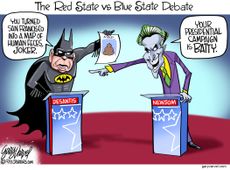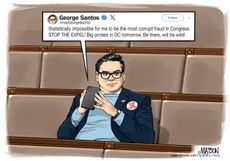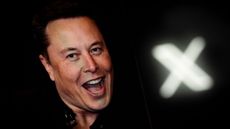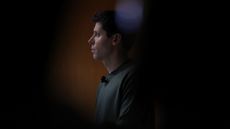Tweet of clay: will Twitter’s demise bring down Elon Musk?
Controversial rate limits come as Meta prepares to launch its rival to the social media platform
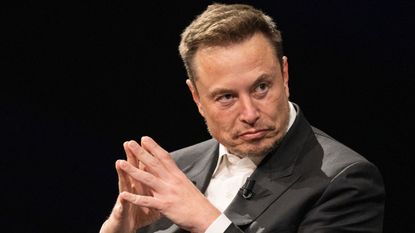
Twitter faced an angry backlash from its users after Elon Musk said the platform was introducing temporary limits on the number of posts that can be viewed.
The billionaire entrepreneur, who bought Twitter for $44 billion in October, announced the “temporary measure” in a tweet on Saturday. He said it was “to address extreme levels of data scraping” on the site by artificial intelligence companies.
An initial 600-tweet limit for unverified users was increased to 1,000 after criticism of the decision, while “rate limits” for verified users were increased from 6,000 to 10,000 tweets a day.
Subscribe to The Week
Escape your echo chamber. Get the facts behind the news, plus analysis from multiple perspectives.

Sign up for The Week's Free Newsletters
From our morning news briefing to a weekly Good News Newsletter, get the best of The Week delivered directly to your inbox.
From our morning news briefing to a weekly Good News Newsletter, get the best of The Week delivered directly to your inbox.
‘Musk’s unravelling image’
It was yet another “perplexing and worrying” decision made by Musk, whose stewardship of Twitter has “lurched from scandal to scandal” since his takeover in October of last year, said Andrew Griffin in The Independent. It remains unclear if, as Musk has claimed, the rate limits have anything to do with scraping by artificial intelligence systems, or if it is an excuse that “chimes with the zeitgeist”, as other social media companies, such as Reddit, have become increasingly concerned over the issue.
“Is Twitter’s so-called rate limit a technical mistake that’s being passed off as an executive decision?”, asked Charlie Warzel in The Atlantic. “Or is it the opposite: a daring gambit of 13-dimensional chess, whereby Musk is trying to plunge the company into bankruptcy and restructuring?”. The unfolding situation had made “conspiracy theorists out of onlookers”, many of whom are now wondering whether Musk has planned to “slowly and steadily destroy the platform all along”.
But what should be “obvious” to anyone who has been paying attention to his Twitter tenure is that Musk is “bad at this”. His “incompetence” at running Twitter should “unravel his image as a visionary, one whose ambitions extend as far as colonising Mars”.
It was his reputation, far more than his vast wealth, that was Musk’s “real fortune”, continued Warzel. “But Musk has spent this currency recklessly. Who in their right mind would explore space with a man who can’t keep a website running?”
‘More sanely run Twitter clone’
It was a “trying weekend” for those who still believe Musk can turn Twitter into a “success story”, said Dave Lee for Bloomberg. Yet the “embarrassment” of having to limit the number of tweets users can see each day was “the surest sign yet that Musk’s cost-cutting has come with real consequences, not the least of which is opening the door to competitors”. Until now, Musk has been “fortunate” that “no real viable alternative” to Twitter has emerged since his takeover last autumn.
But that could be about to “abruptly” change with the arrival of Threads, Meta’s alternative to Twitter, which could be launched as soon as this week. The new platform could “immediately upend” the competitive landscape; one Meta executive described it as an opportunity to create “a more ‘sanely run’ Twitter clone” and one where “the owner doesn’t amplify far-right views or discredit reliable sources of information”.
One of the most concerning aspects of Musk’s Twitter takeover has been his peddling of “far-right conspiracy theories and racist misinformation”, said James Greig, writing for Dazed. And his “drift to the far-right” has come at a cost. While he was once a “broadly popular” figure with the American public, he is now a “polarising” one.
But while being a “divisive figure might pay off if you’re a Republican candidate”, it is less so for a businessman. Tesla shares are struggling and advertisers are abandoning Twitter. “But Musk is still a billionaire and, whatever happens, he will be insulated from the effects of the anger, fear and resentment he is helping to ferment,” wrote Greig. “The rest of us might not be so lucky.”

Continue reading for free
We hope you're enjoying The Week's refreshingly open-minded journalism.
Subscribed to The Week? Register your account with the same email as your subscription.
Sign up to our 10 Things You Need to Know Today newsletter
A free daily digest of the biggest news stories of the day - and the best features from our website
Sorcha Bradley is a writer at The Week and a regular on “The Week Unwrapped” podcast. She worked at The Week magazine for a year and a half before taking up her current role with the digital team, where she mostly covers UK current affairs and politics. Before joining The Week, Sorcha worked at slow-news start-up Tortoise Media. She has also written for Sky News, The Sunday Times, the London Evening Standard and Grazia magazine, among other publications. She has a master’s in newspaper journalism from City, University of London, where she specialised in political journalism.
-
 Today's political cartoons - December 2, 2023
Today's political cartoons - December 2, 2023Cartoons Saturday's cartoons - governors go Gotham, A.I. goes to the office party, and more
By The Week US Published
-
 10 things you need to know today: December 2, 2023
10 things you need to know today: December 2, 2023Daily Briefing Death toll climbs in Gaza as airstrikes intensify, George Santos expelled from the House of Representatives, and more
By Justin Klawans, The Week US Published
-
 5 hilarious cartoons about the George Santos expulsion vote
5 hilarious cartoons about the George Santos expulsion voteCartoons Artists take on Santa versus Santos, his X account, and more
By The Week US Published
-
 Antisemitism on X: Elon Musk goes 'thermonuclear'
Antisemitism on X: Elon Musk goes 'thermonuclear'Why everyone's talking about Social media owner takes Media Matters to court over allegations of advertising next to 'pro-nazi content'
By The Week UK Published
-
 Elon Musk's 'frivolous' but precedent-setting free speech fight with Media Matters
Elon Musk's 'frivolous' but precedent-setting free speech fight with Media MattersTalking Point The lawsuit is just the latest in Musk's ongoing tension with social media watchdogs
By Theara Coleman, The Week US Published
-
 How OpenAI went from an altruistic nonprofit to typical Big Tech startup
How OpenAI went from an altruistic nonprofit to typical Big Tech startuptalking point Internal tensions over the company prioritizing money over safety might be symptoms of a bigger issue
By Theara Coleman, The Week US Published
-
 Inside Sam Altman's 'extraordinary firing' from OpenAI
Inside Sam Altman's 'extraordinary firing' from OpenAIThe Explainer AI superstar joins Microsoft after 'philosophical disagreement' with his old board that stunned tech world
By The Week UK Published
-
 How Grok, Elon Musk's 'rebellious' AI bot, differs from the others
How Grok, Elon Musk's 'rebellious' AI bot, differs from the othersThe Explainer Musk developed the bot as a competitor to ChatGPT
By Justin Klawans, The Week US Published
-
 Why the Metro Memory game is so addictive
Why the Metro Memory game is so addictiveTalking Point Trying to remember London's 416 Tube stops has attracted half a million players so far
By Sorcha Bradley, The Week UK Published
-
 Twitter's year of Elon Musk: what happens next?
Twitter's year of Elon Musk: what happens next?Why Everyone's Talking About 'Your platform is dying', says one commentator, but new CEO is aiming for profitability next year
By Chas Newkey-Burden, The Week UK Published
-
 Can Meta woo Gen Z with AI chatbots?
Can Meta woo Gen Z with AI chatbots?Talking Point Meta is set to release the first of dozens of AI 'personas' aimed at driving Gen Z engagement
By Theara Coleman Published
